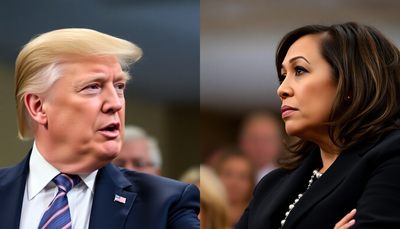Trump vs. Harris: How the 2024 Election Will Determine the Future of STEM Funding in Higher Education

[ad_1]

As the US heads into the 2024 elections, education funding—especially for STEM (Science, Technology, Engineering, and Mathematics) programs—is emerging as a pivotal issue. With Republican Donald Trump and Democrat Kamala Harris taking distinct stances, the future of American higher education and STEM support hangs in the balance. American universities have long relied on federal funding to drive critical research, innovation, and training, attracting thousands of students and researchers globally. However, depending on who wins the 2024 election, this support structure could see significant changes.
Policies under either the Trump or Harris administration will likely influence everything from federal grants and scholarships to the allocation of research funds and visa policies for international STEM students. Here, we explore how the US political climate in 2024 could reshape STEM funding in universities, impacting both domestic and international students.
STEM as a Political Priority: What’s at Stake?
STEM education and research funding have historically been supported across the political spectrum due to their contributions to the economy and national security. STEM fields drive advancements in technology, healthcare, infrastructure, and defense, areas considered crucial to maintaining US global competitiveness. Funding for STEM programs typically flows through agencies like the National Science Foundation (NSF), the Department of Defense (DoD), the National Institutes of Health (NIH), and others.
However, differing party priorities could lead to significant shifts in how funds are allocated. Democrats generally support increasing funds for research in climate science, green technology, and healthcare, whereas Republicans tend to prioritize funding that aligns with national security, defense technologies, and job creation within manufacturing and technology industries. The 2024 election outcome may tilt funding allocations towards one set of priorities or another, affecting which fields within STEM receive more attention and support.
Impact on Research Funding and Innovation
Research funding from federal agencies forms the backbone of many STEM programs at US universities. For instance, the NSF supports projects ranging from artificial intelligence to environmental studies, while the NIH funds extensive research in biomedical sciences. A change in leadership could influence how much funding these agencies receive and how they prioritize projects.
For example, if climate change remains a priority, as is often the case under Democratic leadership, we could expect increased funding for renewable energy research, climate-resilient infrastructure, and related engineering programs. On the other hand, a more conservative administration might steer funding towards defense technologies and cybersecurity, possibly at the expense of environmental sciences.
This reallocation could impact both the type of research opportunities available at universities and the focus areas of STEM departments, affecting where students can direct their academic and professional aspirations.
Implications for International Students in STEM
The US remains a top destination for international students pursuing advanced degrees in STEM fields, thanks to its leading universities and research opportunities. However, political policies regarding visas, funding, and work authorization for international students are highly influenced by the administration in power.
An administration more restrictive on immigration may impose tighter visa requirements, impacting the number of international students who can study and work in the US. Additionally, policies around the Optional Practical Training (OPT) program, which allows international students to work in their field of study for up to three years post-graduation, may be altered based on the political climate. International students, especially those in STEM fields who rely on OPT to gain practical experience, could face added challenges if new regulations limit their work opportunities.
Additionally, the availability of scholarships and fellowships for international students may fluctuate. Many federally funded scholarships and grants are already limited to US citizens, but some STEM research grants support international students on certain visa types. Changes in the political landscape could further restrict these opportunities, influencing the composition of STEM graduate programs and research teams at US universities.




